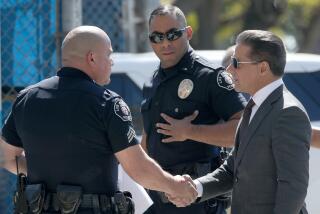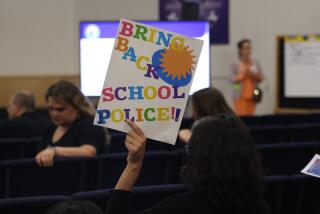Happy First for Poway High School : Drugs: For the first time in county, an undercover operation finds no drug problem and makes no arrests at a school.
- Share via
At Poway High School, no news was good news. An undercover sheriff’s deputy spent nearly four months on the school campus posing as a student last semester and came up with a blank slate of serious student drug users or pushers.
It was the first such sheriff’s undercover investigation to register a goose egg in arrests, Lt. Bob Trevino said. The county special investigations unit has run six such undercover operations since it was formed in 1986.
The San Diego Police Department, which has run about 13 such school drug surveillance operations since 1983, also reports no “clean” schools, Lt. Anthony Dicerchio said. Some school surveillances have been aborted without arrests when the undercover agent was unmasked or when strict campus rules made it impossible for the agent to operate, he said.
At Poway High, school officials have committed money and manpower for several years to enforce a zero-tolerance policy against drugs, alcohol, tobacco or any other harmful substance. Apparently, their tough stance has paid off in making the campus a drug-free island and the undercover operation a bust.
“We’re not naive enough to think that there are no drugs or drug users on the Poway High campus,” Trevino said. “But we had someone undercover there for most of the fall semester who turned up nothing serious enough to warrant arrest.
“I don’t know that they are doing anything any differently than any other school district, but what they are doing is working remarkably well. They should keep it up.”
Ed Nelson, assistant principal in charge of discipline at Poway High, gave a short laugh when asked the school’s secret of success against drugs. “Do you think I’d be sitting here if I knew the answer to that?” Nelson said. No, he’d bottle it and sell it and make a lot of money.
“Seriously, there is no simple answer,” Nelson said. “It’s a combination of a million things--attitudes, philosophy, commitment. It is hard to explain.”
Nelson has been head disciplinarian at Poway High for only a year, but he knows the routine for keeping the kids in line: “We monitor the parking lots before and after school; we maintain a high profile on campus at all times, and I am hardly ever in my office. Students are much less likely to do a little drugs with our presence everywhere.”
And “presence” is the word for it.
A few minutes before the buzzer sounds to signal lunch break, teachers and administrators take their posts, each covering a sector of the campus, many carrying walkie-talkies to maintain contact with the school office and each other.
Most of the monitors circulate around their assigned areas, passing the time of day with students, checking out any huddles that might conceal an illicit activity. Other school staffers, including Nelson, are designated as “roamers,” pacing the campus perimeter and checking out the parking lots, which are off-limits during the school day.
Poway High has a closed campus, as do most area high schools. A parent or guardian must sign a release in the presence of school officials before a student can leave campus during the school day.
Monitors are stationed in the hallways; guards are stationed at the entryways to the high school grounds and parking lots. No one goes in or out without friendly questioning and presentation of a pass legitimizing his or her errand.
In the quad, where the largest number of lunching students congregate, cliques are common.
“There’s the seniors over by the senior wall and the basketball team over there,” Nelson gestured. “The same every day. You could almost take roll.”
The strolling monitors, identifiable by their ages and more sedate attire, thread their way through the mass of students. If a disturbance arises, several monitors within earshot or view converge on the scene and deal with the problem before a crowd gathers.
“The administration and the school board think enough of this program to pay teachers for their monitoring time,” Nelson said. “There has to be commitment all the way from the bottom to the top.”
There are stress times on the Poway campus when things can get out of hand if the monitors aren’t on their toes, Nelson said. Final exam times, the outbreak of war in the Persian Gulf, the start of a new school year, and, coming up, burnout time in June.
Poway Unified School District has a stricter disciplinary policy against students who violate the rules than do most San Diego County school districts, according to David Hughes, assistant superintendent in charge of secondary schools in the district.
A first-offense penalty for students in possession of or under the influence of drugs or alcohol on campus or at a school-sponsored event is transferred to another high school in the district, Hughes said. The transfer lasts through the remainder of the semester and through the following semester.
“That may not seem too stiff a penalty, but the kids hate to be transferred away from their friends to another school,” Hughes said.
Inter-school rivalry among the district high schools--Poway High in Poway, Mt. Carmel in Rancho Penasquitos and the new Rancho Bernardo in Rancho Bernardo--is high, “which works in our favor,” Hughes said.
Students are sometimes transferred to the district’s continuation school if their behavior warrants it, but usually they go to one of the other district high schools to serve their time before being readmitted to their “home” school.
Critics of the district’s program claim administrators are “only moving the problem from one place to another,” Hughes said, “but we think it does a lot to remove students from a negative environment. They know that at the new school they are under a microscope and had better clean up their act.”
A second offense brings expulsion from the school district. Drug-selling or possession of a large quantity of drugs brings expulsion at first offense.
“We’ve had this system in place for a number of years,” he said. “It’s not an easy policy to enforce. We get a full range of response from parents, ranging from those who are thankful we have identified the problem and done something about it to those who think our system is too severe and disruptive.”
The undercover “narc” enrolled in Poway High classes at the beginning of the fall semester with only Supt. Robert L. Reeves aware of it. Everyone else found out about it when the results were announced in January.
Lt. Trevino would not identify the deputy, even to say whether it was a man or woman who masqueraded as a student, attending classes, handing in assignments and taking tests.
Because students are wise to undercover drug surveillance procedures used in other schools, “they were very, very suspicious of our person at first as they would have been of any newcomer,” Trevino said. Gradually, the deputy was accepted. After that, it was just a matter of keeping his or her eyes open, Trevino said. “If drugs are present, you’re going to see it.”
Sheriff’s undercover officers do not attempt to buy drugs from students or to sell drugs on campus, Trevino explained, “because that would be entrapment.”
Before the undercover officer dropped out of Poway High at the start of Christmas vacation, he or she had observed students with small amounts of marijuana, but had not seen a student under the influence of drugs on campus or any student using drugs at school, Trevino said.
A concurrent undercover surveillance at Valhalla High in El Cajon ended in eight student arrests, but Trevino said the East County school’s administrators “have a pretty good handle on the problem” and should be complimented. “It’s when the the arrests mount up to 30 or 40 or more that you know the drug problem is out of hand,” he said.
And what do the students think of the big brother treatment they receive at Poway High? They hardly think about it at all. It’s the same system they’ve been under since they started middle school in seventh grade.
“It makes you think twice about getting mixed up in anything that’s going on,” a gangling senior said as he surveyed the mob of students from his perch on the senior wall.
“I guess I feel safer,” said a freshman girl. “I don’t really even notice it anymore.”
“They don’t mess with us,” her boyfriend commented. “Most of the teachers are pretty OK people. Uh, you aren’t a narc, are you ma’am?”
More to Read
Sign up for Essential California
The most important California stories and recommendations in your inbox every morning.
You may occasionally receive promotional content from the Los Angeles Times.













